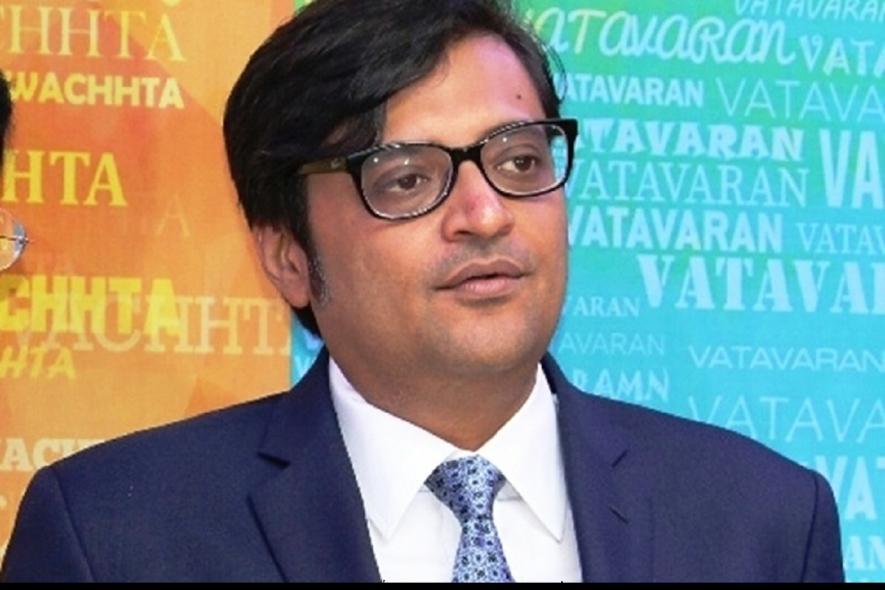Why Arnab’s Sensational Arrest Will Hurt Real Dissent

Image Courtesy: IANS
The sensational arrest on Wednesday of Republic TV’s fiercely pro-establishment anchor Arnab Goswami by Maharashtra Police has pleased many who abhor his brand of “journalism”. Arnab’s TV shows are indefensible. A self-absorbed and vicious propagandist, he has been unapologetic for the many vile things said on his channel. Yet by arresting him the Maharashtra government has not stood up for quality journalism. Instead it has been equally unapologetic in displaying the might of the state—a state that is all-encompassing and represents pure power.
Arnab has been arrested for a “double suicide” case that was all but shut down two years ago, not for his primetime vitriol. Many would say Maharashtra is giving back what it got from Arnab, especially during the Sushant Singh Rajput episode. But this is not the case either. The reason for Arnab’s arrest is that the state is now “allowed”, or expected, to take extraordinary and sensational steps in the name of law and justice. The jubilation among ordinary netizens over Arnab’s arrest is a measure of public support for such action. The celebrations make it evident that BJP’s supporters are not the only ones who wish for a powerful state. It seems many others want the same thing—a state that is seen to be doing something, anything, it does not matter what, so long as it is strict and tough-talking.
The problem with his arrest is not that Arnab will suffer a trial or be unable to work as a journalist until placed in custody. (He may get bail in the very first hearing scheduled on Thursday afternoon.) The problem is in the way the self-absorbed—some would say megalomanic—celebrity has been put in the same category as those who are genuinely fighting for the life of the republic. Real journalists and activists are trivialised when the state places Arnab in the same category as them—arrestee or under-trial. If today genuine journalism is undermined by this arrest, tomorrow even the causes genuine activists and reporters speak for will end up being trivialised. This is because the message from Arnab’s arrest is that it does not matter what the nature of your act is; the state can, and will, crack down on you.
In arresting Arnab, the Maharashtra government is eliminating the distinction between victim and accused. Two months ago, in the Sushant Singh Rajput case, a public outcry was whipped up by the likes of Arnab, the BJP, and its supporters, who cooked up a variety of ruses to blame actor Rhea Chakraborty for his death. First they said Rhea had abetted suicide by mentally torturing Rajput, not “taking care” of him and so on. Ultimately, Rhea was not charged with abetment, but the state arrested her anyway—for allegedly procuring marijuana.
In the same way, Arnab was first charged with the TRP scam and thereafter an older case of abetment of suicide was reopened against him. As a result, Rhea and Arnab have fallen in the same category now—both face trial after being accused of something other than what they purportedly did. In response to the critics of Arnab’s arrest, the Maharashtra government has said that the law will take its own course. But in criminal cases, it is the nature of the offence that determines the outcome. In other words, abetment of suicide is notoriously difficult to prove.
If it were not, why have state governments not arrested bank employees whose attempts to recoup unpaid loans from farmers have led to thousands of suicides? Why has Maharashtra, after a spate of farmer suicides, not acted against agents of moneylenders and banks? So many people are being denied wages during the lockdown, not being paid on time or denied full wages. Many instances exist of their suicide. If Arnab and Rhea instigated someone into ending their life, have not the banks and financial institutions instigated borrowers too?
Even the distinction between the BJP and Shiv Sena-Congress regimes is being eroded. BJP leaders, especially at the top, get upset if someone opposes their government, party or policies. And yet equating Rhea and Arnab is problematic because their experiences of law and justice have been unequal. Rhea faced a vicious social media campaign and cyber-bullying. An environment was created in favour of her arrest, though she was not arrested for the crime for which she was pilloried. Still nobody in a position of power stood up for her. On the other hand, Amit Shah, the Union Home Minister, stood up for Arnab, with the who’s who of the Modi Cabinet.
Yes, Arnab has brought disgrace to journalism, but since his journalism is not in the dock in the Maharashtra government’s case, it seems as if anybody can go to jail, nobody is safe. The state has empowered itself to use criminal laws against citizens irrespective of what their actions amount to, whether they are an activist fighting for tribal rights in Gadchiroli or marking an important anniversary in Bhima Koregaon.
If the Maharashtra government felt Arnab’s TV appearances were hate speech, it could have applied section 153A of the Indian Penal Code which proscribes promoting enmity, disharmony, and so on. It could have approached the Press Council of India (PCI). In other words, the state does have powers to control the press, but perhaps these powers are seen as ineffective because the PCI Act does not allow the police to swoop on and arrest a journalist. For a state that wants to appear powerful, draconian measures are essential.
A section of the public has started taking pleasure in violence and lost its emotive moorings—a nation raring for revenge is unable to differentiate between anger, grief, sadness, injustice, cruelty. The state fosters the confusion by implicating individuals or groups in one or the other of the 511 sections of the IPC and its stray subclauses. That is what the recent high-profile cases suggest—the Delhi riot cases are a litany of phone records that make students look like conspirators, the Bhima Koregaon case (like others of its kind) hints at liability for a design to commit an offence, and Arnab’s case falls back on abetment. When insinuations, as in Rhea’s case, rather than specific crimes become the subject of criminal trials, the principle that a hundred guilty may escape rather than one innocent suffer is defeated.
True, life has come a full circle for Arnab. Months ago, he was flashing letters, purportedly written by human rights activists, which underlined a “conspiracy” to assassinate the Prime Minister. Yet one can argue that the state apparatus has literally not changed to measure up to this kind of journalism. Take Parambir Singh, the present Mumbai Police Commissioner, who has become an icon for those who are cheering Arnab’s discomfort. When the Bhima Koregaon cases were registered in January 2018, Singh was Additional Director General of Police (Law and Order), Maharashtra. So, he was one of the senior officers under whose watch the arrests in the case and its overall supervision were done.
In the Bhima Koregaon case two FIRs were registered, the first on 2 January 2018, by the Pune (Pimpri) rural police. This FIR named right-wing leaders Milind Ekbote and Sambhaji Rao Bhide. Six days later, the Vishram Bagh Police Station (Pune City) filed an FIR too. For two years, the Pimpri case has languished, while the Vishram Bagh case has swelled into a giant conspiracy in which virtually half of India’s top human rights activists have been locked up.
The public should first consider the course of justice in Maharashtra before making Parambir Singh into a hero. On 31 August 2018, he held a press conference in which “evidence” of Maoist links of some activists arrested in the Bhima Koregaon case was revealed to the press. This was heavily criticised. When the purportedly incriminating documents were not supplied to the court by Maharashtra Police, it led to further controversy. But now, arguably, the methods of Bhima Koregaon are being followed in the Arnab case: first Mumbai Police registered an FIR for a TRP scam, then police from Raigad came to arrest him for abetment to suicide.
Not just this: In September 2018, the Supreme Court, in a minority ruling, called the Bhima Koregaon matter a “proper case for the appointment of Special Investigating Team. Circumstances...cast a cloud on whether the Maharashtra police has in the present case acted as fair and impartial investigating agency.” After this legal opinion, the state government considered an SIT to re-examine the previous BJP-Shiv Sena regime’s Bhima Koregaon investigation. But the Centre wrested control by handing over the case to the National Investigation Authority. Now Maharashtra is mulling over another probe, but that is a tussle for legal minds to figure out. What matters is how Arnab or Rhea or activists become pawns in a political battle between the Centre and the state. In this competitive display of brute power, Arnab will be charged, Rhea will be jailed, and dissenters, too, will be suppressed.
In vitriol, nobody can challenge Arnab and his TV channel. He once said “the Vatican” [implying Sonia Gandhi] would be pleased that a mob had lynched a Hindu ascetic in the state. He openly challenged Thackeray and Salman Khan, the Bollywood star, during the Sushant Rajput episode, and worse. But the issue is not just the freedom of expression of a journalist. Many in the media realise that supporting his arrest will undermine the entire media. It will only make the political battle to hurt journalists much worse.
Get the latest reports & analysis with people's perspective on Protests, movements & deep analytical videos, discussions of the current affairs in your Telegram app. Subscribe to NewsClick's Telegram channel & get Real-Time updates on stories, as they get published on our website.
























